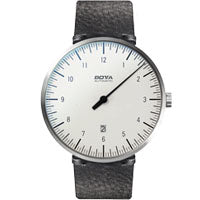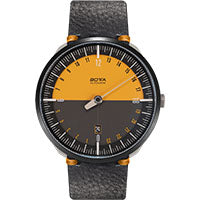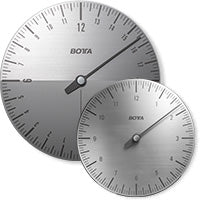Time is your most valuable asset.
But how much of it do you invest in activities that bring neither joy nor meaning?
Our fifth time impulse, “Question Time,” invites you to critically examine your time habits.
Why we should question our time habits
In an age of constant connectivity and sensory overload, we easily slip into autopilot. We follow established routines without reflecting on whether they still align with our values and goals. Time passes—often unnoticed—through activities that do little to move us forward.
Klaus Botta, time philosopher and founder of the watch brand BOTTA, observes:
“Most people complain about a lack of time while simultaneously investing significant portions of it in habits that make them neither happier nor more successful.”
This gap between perceived time scarcity and actual time use is the starting point of our fifth impulse: Question Time.
What does Question Time mean?
Question Time means consciously examining your time habits:
-
Which activities regularly consume time without offering real value?
-
Which routines exist only out of habit, not conviction?
-
Where do you consistently lack time—and why?
It’s not about optimizing every minute or becoming more productive. Instead, it’s about using your time more intentionally and creating space for what truly matters to you.
Identifying time wasters: the usual suspects
Our experience shows that certain activities often evolve into unnoticed time traps. Here are some typical examples:
-
Endless social media scrolling: What begins as a short break easily expands into long sessions.
-
Meetings without purpose: Gatherings that yield neither decisions nor insights.
-
Excessive news consumption: Constantly following updates you can neither influence nor need to.
-
Perfectionism in trivial matters: Spending disproportionate time on details that make little difference.
-
Notification overload: Continuous interruptions that break your concentration.
-
Blurry boundaries between work and leisure: Checking work emails at night or personal messages during office hours.
Interestingly, many of these time wasters are relatively new. Most didn’t even exist 20 years ago. Social networks in particular have become some of the most powerful attention—and time—magnets of our era.
The Question Time process: Three steps to time clarity
How can you systematically question your time habits? We recommend a three-step approach:
1. Assessment: Where does your time go?
Keep a simple time log for one week. Note broadly how you spend your hours (you’ll find templates in Time Impulses 3 and 4).
It’s not about perfect documentation—it’s about awareness.
Also consider your energy balance: Which activities energize you, and which drain you?
2. Critical review: The value-time analysis
Look at each recurring activity and ask yourself:
-
Does this contribute to my values or goals?
-
Would I miss it if it were gone?
-
Could I do it more efficiently, less often, or differently?
An especially powerful exercise: Imagine you had only half as much time. What would you cut?
3. Conscious decisions: Eliminate, reduce, or transform
Now comes the decisive step—turn reflection into action.
-
Eliminate: Remove activities that add no real value.
-
Reduce: Limit duration or frequency.
-
Transform: Change how you do them (e.g., walking meetings instead of sitting ones).
The key is to make intentional choices instead of staying in autopilot mode.
The art of conscious letting go
Question Time inevitably leads to letting go. But letting go is not restriction—it’s liberation. It creates space for what truly matters.
The Bauhaus philosophy, which also inspires our watches, captures this perfectly: “Less is more.”
This principle applies not only to design, but also to how we manage our time.
Letting go doesn’t mean self-denial—it means conscious selection. It’s the art of distinguishing the essential from the trivial—and having the courage to release the latter.
Question Time in practice: Real-world applications
Here are some practical ways to bring Question Time to life:
-
Digital detox: Uninstall apps that regularly consume time without real benefit.
-
Meeting diet: Cut meeting lengths by 25% and define clear objectives.
-
Limit news consumption: Set fixed times to read or watch news instead of checking constantly.
-
Create focus blocks: Schedule uninterrupted time each day for deep work.
-
Practice saying no: Develop polite but firm responses to requests that don’t align with your priorities.
These practices require discipline at first—but soon become liberating habits.
The reflection question: What can go?
At the heart of Question Time lies a simple but powerful question:
What can go, so that what matters can grow?
This question invites you to think beyond time management—to life management.
Every “yes” to one thing is a “no” to something else.
Take a moment to reflect: Which activity, obligation, or habit could disappear from your life to make room for what truly matters?
Time is life – Question Time in the BOTTA philosophy
At BOTTA Design, we don’t see time as an abstract measure—but as life itself.
Every minute is a piece of your life—too precious to spend unconsciously.
Our watches embody this philosophy through their clear, minimalist design.
They don’t distract—they focus. They make time tangible and encourage mindful living.
Question Time is more than an exercise—it’s an attitude.
An attitude that fosters clarity, awareness, and sovereignty in how you live your time.
Your next step: The Question Time Challenge
Would you like to experience Question Time in practice?
Join our 7-Day Challenge:
-
Each day, identify one activity that consumes time without adding real value.
(Use your time chart from Impulses 3 and 4 if you have one.) -
Decide consciously to eliminate, reduce, or transform it.
-
Note how the regained time and clarity feel.
Share your experience with us if you wish. This simple exercise could be the beginning of a new time culture—one where you rule your time, not the other way around.
Conclusion: More life through mindful questioning
Question Time is a key to greater time autonomy and quality of life.
By regularly questioning how you spend your time, you don’t just reclaim hours—you reclaim presence and purpose.
Ultimately, it’s not about doing more or being more efficient.
It’s about living more consciously and investing your time in what truly matters.
So we invite you:
Question your time. Challenge your habits.
And make space for what enriches your life.
FAQ: Question Time
How often should I question my time habits?
We recommend a regular rhythm—quarterly for deeper reflection, weekly for short check-ins.
Transitions or phases of increased time pressure are especially valuable moments to reflect.
Are there areas I should never cut back on?
Yes—be cautious with activities that support your health, key relationships, or personal growth.
They may seem optional, but they form the foundation of your well-being and performance.
How do I handle time wasters I can’t eliminate?
Find ways to optimize or limit them. Set clear time boundaries or improve the quality of the activity to extract more value from the time invested.
What if others don’t respect my new time boundaries?
Communicate them clearly and kindly. Explain why the change matters to you.
Most people respect well-reasoned decisions when they’re expressed thoughtfully.
How can I tell if my Question Time practice is working?
Watch for three signs:
-
You have more time for what truly matters.
-
You feel less rushed and overwhelmed.
-
You experience more moments of presence and satisfaction.
If so, you’re on the right track.
Want to explore the BOTTA time philosophy further?
Subscribe to our Your Time newsletter and receive weekly impulses to help you live—and experience—time more consciously.
This time impulse is part of our Your Time principle—a philosophy that helps you develop a new awareness of your personal time and manage it more confidently. Discover all 28 time impulses and change your view of time.
Subscribe to our newsletter now and receive a new time impulse directly in your inbox every week. Your time is your life – shape it consciously!











1 comment
wieder mal ein Artikel über Zeitmanagement, dachte ich. Sicher nichts neues, aber man kann ja mal reinlesen, dachte ich dann. Gefühlt eine Minute später (ok, es können auch zehn gewesen sein) habe ich bemerkt, dass ich doch den ganzen Artikel gelesen habe. Sehr spannend und was mich am meisten überrascht hat: ich habe einige neue Sichtweisen erfahren. Besonders die Idee mit der grafischen Dokumentation der täglichen Tätigkeiten aus der letzten Folge, werde ich definitiv ausprobieren. Eine sehr gute Idee. Überhaupt finde ich das ganze Thema sehr bedeutsam in unserer überladenen Zeit. Ich bin schon sehr gespannt und freue mich auf die nächsten Folgen. Machen Sie weiter so.